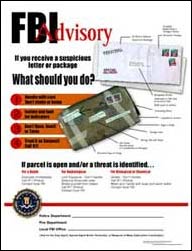|
Anthrax and the Mail
How to Spot and Deal With a Suspicious Letter or Package
• NPR Science Desk primer on anthrax
 More broadcast coverage of the anthrax investigation. More broadcast coverage of the anthrax investigation.
Oct. 15, 2001 -- The increasing number of suspected anthrax cases in recent days have heightened public concerns about the mail. Following are tips for evaluating and dealing with suspicious letters or packages.
 | |
An FBI poster advises the public on what to do if a suspicious letter or package is received.
Photo: FBI
Click for enlargement (Adobe Acrobat required)
|
What constitutes a suspicious parcel?
According to the United States Postal Service and FBI, suspicious items are those that:
• Are unexpected, or from someone unfamiliar to you
• Are addressed to someone no longer with your organization or are otherwise outdated
• Have no return address, or have one that can't be verified as legitimate
• Have labels or writing containing misspelled words
• Are addressed to someone by title only or have an incorrect title
• Are of unusual weight, relative to their size, or are lopsided or oddly shaped
• Are marked with restrictive markings, such as "Personal" or "Confidential"
• Have protruding wires, strange odors or stains; are discolored or show crystallization on the wrapper
• Show a city or state in the postmark that doesn't match the return address
• Are packed with excessive tape or string
What should you do if you receive such an item in the mail?
• Handle it with care: Don't shake or bump it or try to empty its contents.
• Do not try to open the parcel, or to smell or taste its contents.
• Isolate the item. "Place the envelope or package in a plastic bag or some other type of container to prevent leakage of contents," the Centers for Disease Control says. If a container is not available, cover the envelope or package with anything -- clothing, paper or trash can -- and do not remove this cover.
• Evacuate the immediate area. Leave the room and close the door to prevent others from entering.
• Wash your hands with soap and warm water to prevent spreading any powder to your face.
• Call police at 911 to report the item. If you're at work, also report it to your supervisor and building security.
Sources: FBI, United States Postal Service, Centers for Disease Control and Prevention
Other Resources
• United States Postal Service
• FBI and photos of anthrax-laced letters sent to Sen. Tom Daschle, NBC's Tom Brokaw and the New York Post.
• Centers for Disease Control and Prevention
|